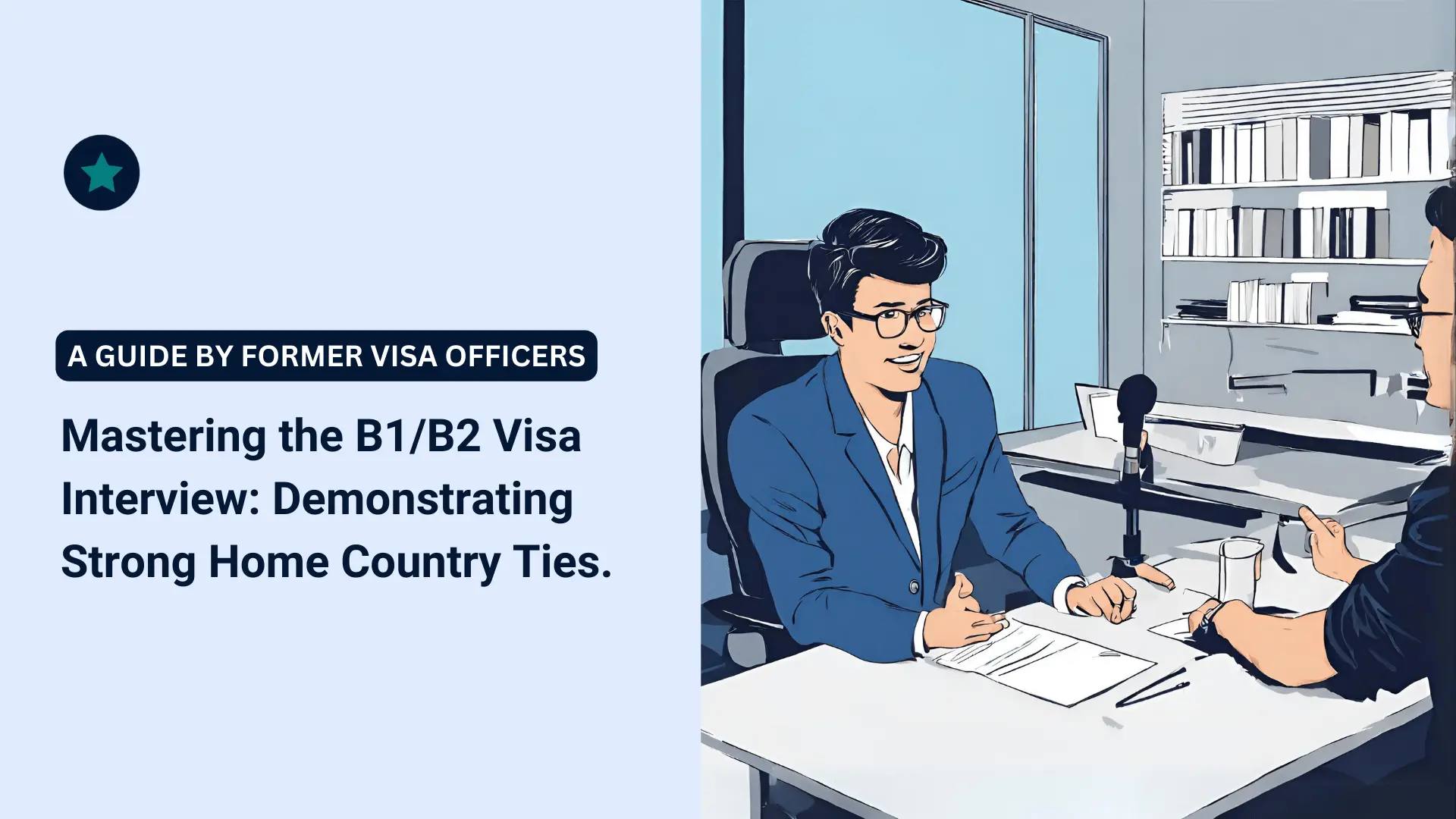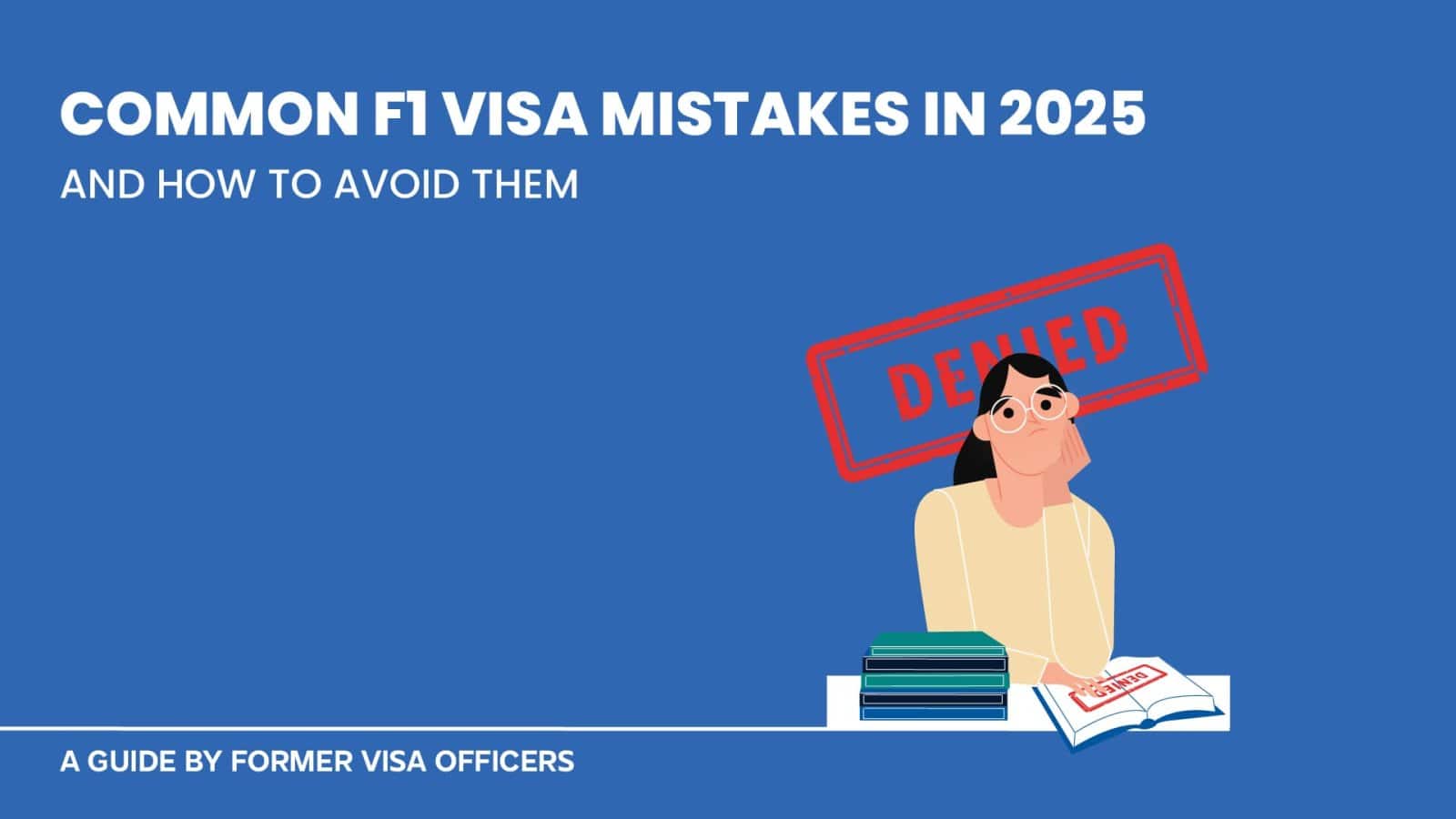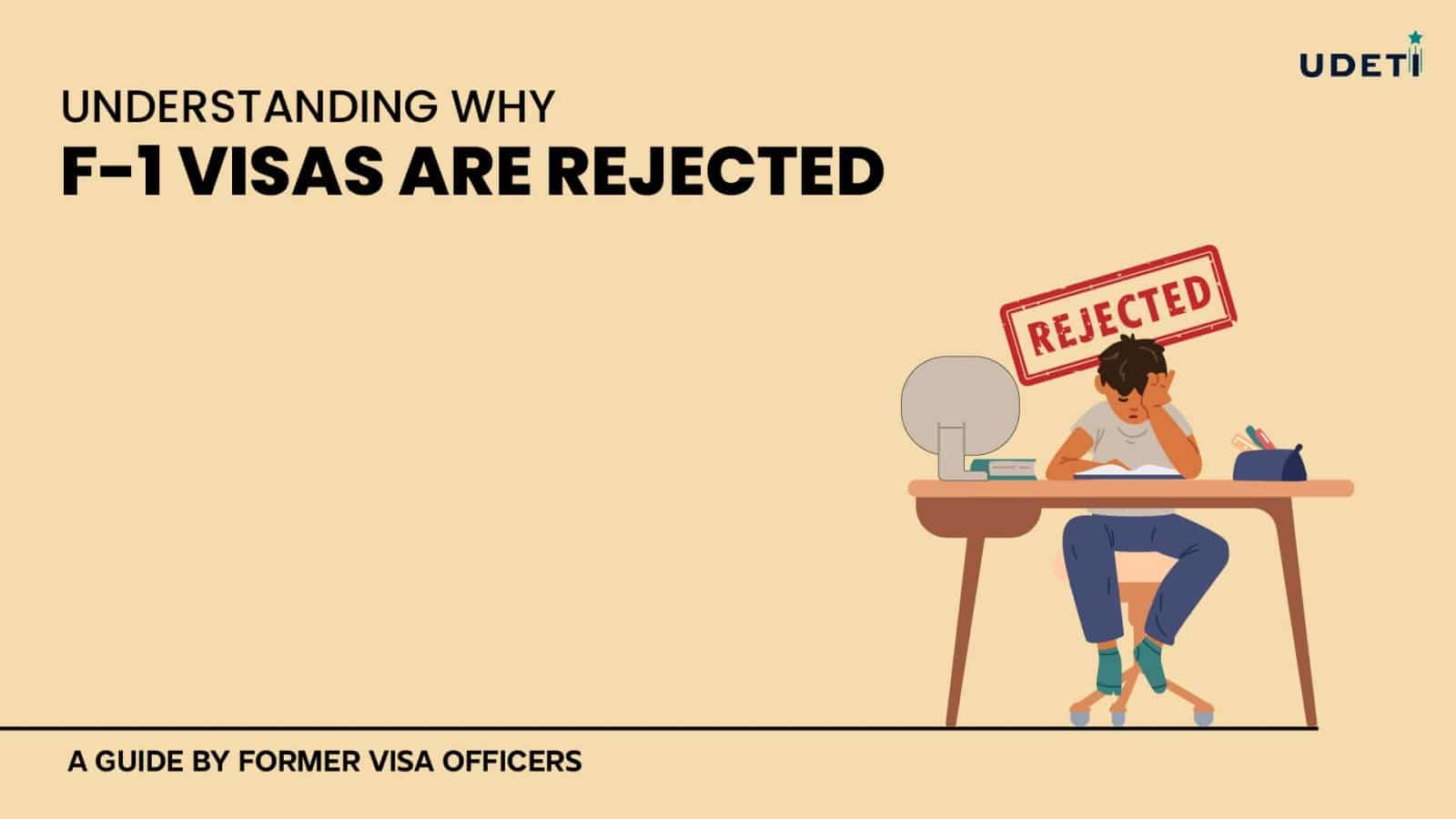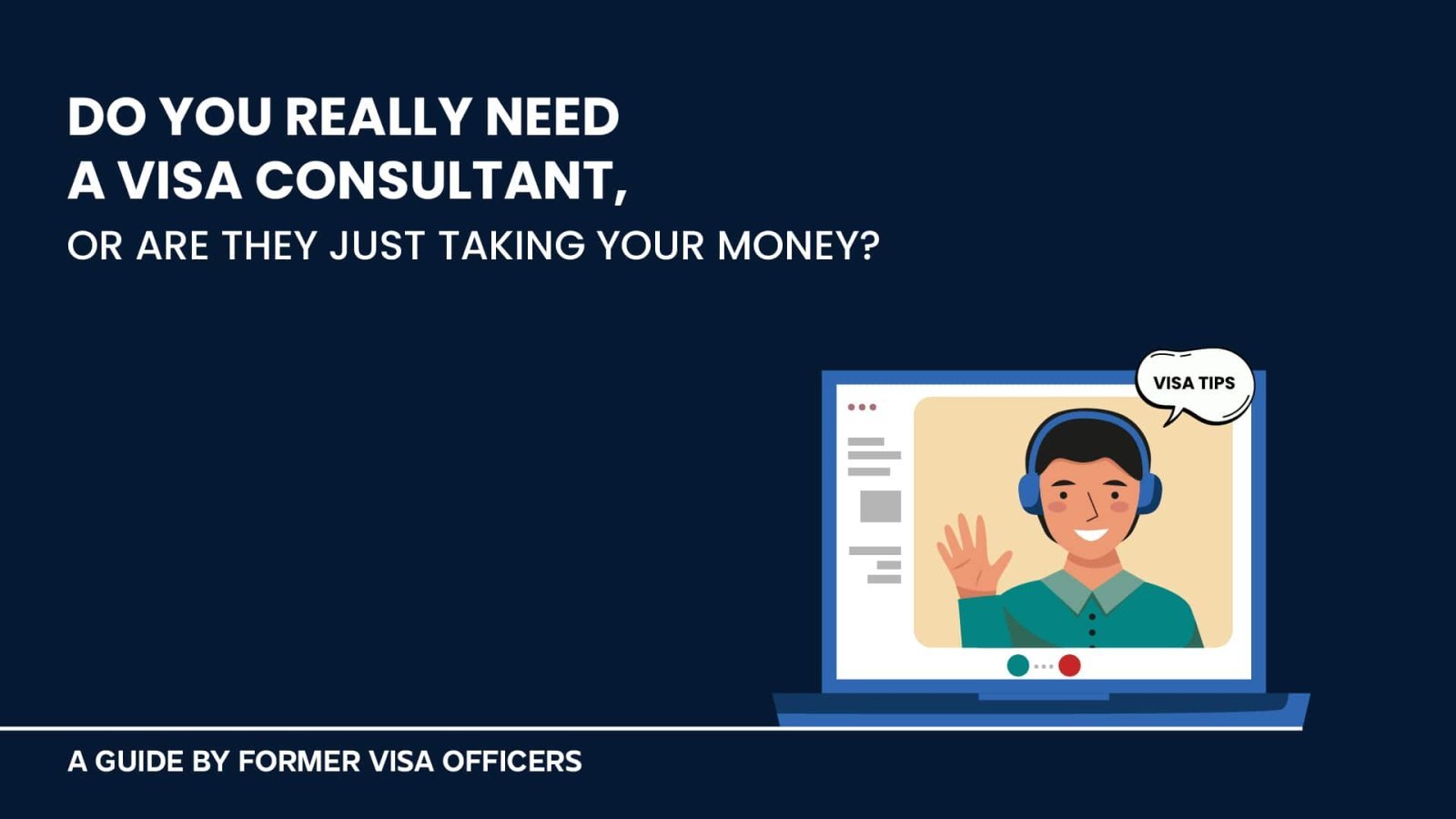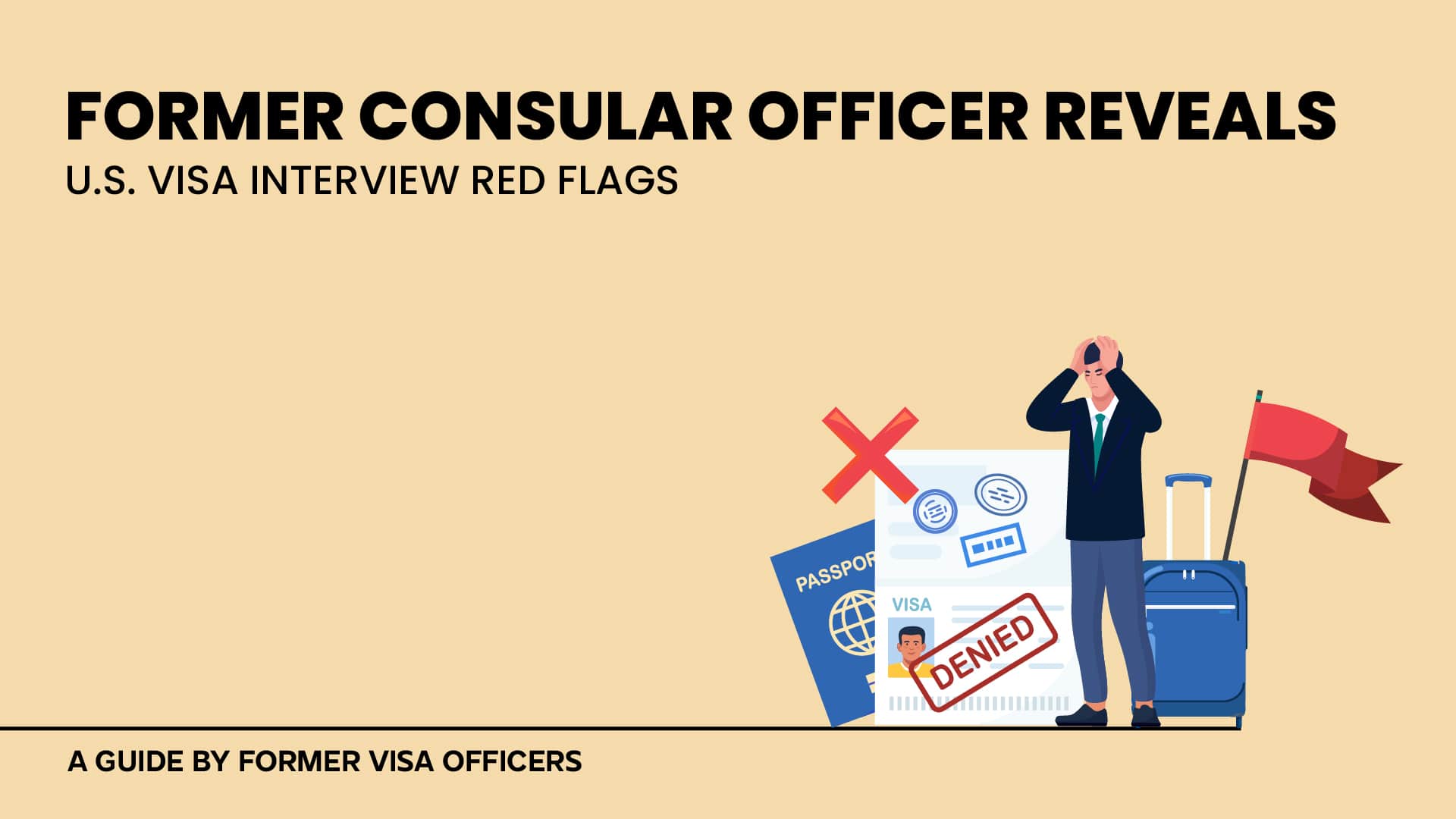In the realm of B1/B2 visa interviews, the ability to demonstrate strong ties to your home country stands as an important factor. This aspect often becomes the deciding element in the approval or denial of your visa application.
The concept of ‘ties’ refers to the various connections an individual has with their home country, such as family, employment, property, or social commitments. Visa officers give considerable weight to these ties as they indicate the likelihood of an applicant returning home after their visit to the U.S.
In this blog, we’ll unravel why these ties are pivotal and how you can effectively present them during your visa interview. Understanding this can significantly enhance your chances of a successful visa application.
Understanding B1/B2 Visas and the Role of ‘Ties’
B1/B2 Visas: A Brief Overview
The B1/B2 visa is a non-immigrant visa for individuals seeking temporary entry into the United States. Primarily, it serves two purposes: the B1 visa is for business-related visits, including consultations, conferences, and negotiations, while the B2 visa caters to tourists, medical treatments, and social events. Understanding the specific nature of these visas is important for applicants to align their intentions with the visa requirements.
Importance of ‘Ties’ in the Visa Process
One of the key factors that visa officers evaluate during the interview process is the applicant’s ties to their home country. These ties act as indicators that the applicant intends to return home after their temporary stay in the U.S. Essentially, visa officers are assessing the risk of applicants overstaying or not adhering to their visa conditions. Strong ties to the home country can notably enhance the credibility of the applicant’s intention to return.
The Significance of Strong Ties
Strong ties to one’s home country are a crucial aspect of the B1/B2 visa application process. These ties are essentially the factors that bind an individual to their country of residence, indicating their likelihood to return after their visit to the United States. Strong ties can be varied and multifaceted, encompassing personal, professional, social, and economic aspects of an applicant’s life.
Examples of Strong Ties:
- Family Relationships: Close family connections in the home country, such as a spouse, children, or dependent parents, are valid ties. The presence of immediate family members, especially dependents, strongly indicates the applicant’s obligation to return.
- Employment: A stable job or a business in the home country is a powerful tie. It demonstrates a steady source of income and a commitment that requires the applicant’s physical presence in their home country.
- Property Ownership: Owning property, such as a house or land, in the home country is another strong tie. It shows long-term investment and roots in the community.
- Social and Economic Engagements: Active participation in community activities, memberships in local organizations, or ongoing economic engagements can also serve as substantial ties. These activities reflect the applicant’s involvement and commitment to their home society.
Preparing Your Case – The DS-160 Form
The DS-160 is not just a bureaucratic requirement; it’s a narrative of your ties and intentions. Visa officers review this form closely to understand your background, your reasons for traveling, and your connections to your home country. A well-prepared DS-160 form can create a positive impression and set a strong foundation for your visa interview.
The Role of the DS-160 in Demonstrating Ties
The DS-160 form is a critical component of the B1/B2 visa application process. It’s not just a formality; it’s an opportunity for applicants to present their case effectively. This form is the first point of interaction with the visa officer, and it sets the tone for the interview.
Accurately and strategically completing the DS-160 can impact how a visa officer perceives an applicant’s ties to their home country. However, if you find that you need to make changes to your DS-160 form after submission, it’s important to handle it correctly.
Need to speak to a former U.S. consular officer?
Tips for Reflecting Strong Ties in the DS-160:
- Employment Details: Be thorough when filling out your employment history. This section should reflect stability and commitment in your career, which are indicative of strong ties to your home country.
- Family Information: Include detailed information about your family, especially those residing in your home country. This demonstrates your personal connections and responsibilities.
- Travel History: Your travel history can also reflect ties. Frequent short trips to various countries, with a record of returning to your home country, can demonstrate a pattern of compliance with visa regulations and good finances.
- Accuracy and Honesty: Ensure that all information is accurate and truthful. Discrepancies or false information can lead to visa denial and long-term consequences.
Articulating Your Ties During the Interview
Strategies for Communicating Ties
- Be Specific and Detailed: General statements about ties are less effective than specific details. For instance, instead of just saying you have a job, describe your role, your responsibilities, and why your presence is essential in your home country.
- Family Ties: If family ties are your strongest link, talk about them in a way that highlights your commitments. Mention any dependents or family responsibilities that necessitate your return.
- Property and Investments: If you own property or have investments, be prepared to discuss them. Explain how these commitments tie you to your home country.
- Educational and Social Engagements: If you are involved in ongoing educational courses or active in community organizations, mention these as evidence of your deep-rooted connections.
Answering Questions About Ties
Visa officers may ask indirect questions to gauge your ties. Be prepared to read between the lines and understand what they are trying to ascertain. Your answers should always circle back to how your life in your home country necessitates your return. Be honest and genuine in your responses. Fabricated stories or exaggerated claims can be easily spotted by experienced officers and will work against you.
It’s beneficial to practice your responses but avoid memorized or rehearsed answers. Your responses should feel natural and spontaneous, reflecting genuine ties and intentions.
Special Considerations for Different Applicant Profiles
Addressing Challenges for Younger Applicants:
Younger applicants often face more scrutiny regarding their ties due to their typically less established life circumstances. If you’re a younger applicant, focus on:
- Educational Commitments: If you’re a student or recent graduate, emphasize your educational ties, such as ongoing studies or future educational plans in your home country.
- Career Aspirations: Discuss your career goals and how they are rooted in your home country. Mention any job offers or future business plans that require your presence there.
- Family and Social Networks: Highlight your dependence on or responsibilities towards your family and your involvement in social networks or community groups.
For Self-Employed Individuals:
- Business Commitments: Discuss the nature of your business, its location, and why your presence is determinal to its operation.
- Economic Ties: Explain your business investments, client relationships, and future projects that necessitate your return.
Applicants Without Traditional Ties:
Not all applicants will have traditional ties like a job or property. In such cases, focus on:
- Social and Community Involvement: Active participation in community events, clubs, or organizations can demonstrate your engagement with your home country.
- Family Responsibilities: Even if you don’t have immediate family, extended family ties and responsibilities can still carry a lot of importance.
- Future Plans: Discuss your plans that are firmly rooted in your home country, whether they are educational, professional, or personal.
Common Misconceptions and Mistakes to Avoid
When preparing for a B1/B2 visa interview, it’s essential to be aware of common misconceptions that can lead to mistakes in demonstrating home-country ties. Understanding these pitfalls can help applicants present their cases more effectively.
Misconception 1: Wealth Equals Strong Ties:
One common misconception is that demonstrating wealth or financial stability is enough to establish strong ties. While financial status is a factor, it’s not the only one. Visa officers look for a range of ties, including social, familial, and professional connections.
Misconception 2: Overemphasis on Ties in the Home Country:
While it’s important to demonstrate strong ties to your home country, overemphasizing them without a clear travel purpose can raise concerns. Your travel purpose should align logically with your ties and overall situation.
Avoiding Mistakes in Demonstrating Ties:
- Avoid Vague Statements: Be specific about your ties. Vague or general statements can weaken your case.
- Don’t Exaggerate or Fabricate Ties: Honesty is key. Exaggerated or false claims about ties can lead to visa denial.
- Not Understanding the Interviewer’s Perspective: Remember, the visa officer’s goal is to assess the risk of you overstaying or misusing your visa. Tailor your responses to address this concern directly.
- Ignoring the Importance of the Travel Purpose: Ensure that your stated purpose of travel is clear, reasonable, and aligns with your ties to your home country. It’s essential to strike a balance between demonstrating your ties and articulating a credible and legitimate purpose for your visit. Both aspects are equally important in the eyes of the visa officer.
The Value of Personalized Consultation
Every visa applicant has a unique background and set of circumstances. This individuality means that a one-size-fits-all approach to visa interviews is not effective. Personalized consultation can be crucial in tailoring your application and interview strategy to reflect your situation.
Benefits of Expert Guidance:
- Understanding Nuances: Visa experts, especially those with experience as former visa officers, understand the nuances of the visa process. They can provide insights into what officers look for and how to effectively present your case.
- Identifying Strengths and Weaknesses: A personalized consultation can help identify the strengths and weaknesses in your application. Experts can offer advice on how to highlight your strong ties and address any potential red flags.
- Mock Interviews and Feedback: Practicing with an expert who can provide constructive feedback is invaluable. They can simulate the interview environment, helping you to become more comfortable and confident.
Choosing the Right Consultant:
When seeking consultation, it’s important to choose someone with the right expertise and experience. Look for visa consultants who have a background in visa processing or immigration law and who have a track record of successfully helping applicants.
The Role of Consultation in Your Visa Journey:
Consultation should be seen as an integral part of your visa application journey. It’s an investment in making your case as strong as possible. While it’s not a guarantee of visa approval, it enhances your ability to present a compelling and convincing application.
Conclusion
In conclusion, a successful B1/B2 visa interview hinges on clearly and honestly demonstrating your ties to your home country, ensuring each part of your application, from the DS-160 to interview responses, reinforces your temporary visit intentions.
Ultimately, preparation and personalization are the keys to a successful visa application. Understanding the unique aspects of your situation, avoiding common misconceptions, and possibly seeking expert advice can significantly improve your chances of approval.
Approach the process with confidence, clarity, and a strong sense of your ties to your home country, and you’ll be well on your way to securing your B1/B2 visa. Connect with former consular officers at Udeti today for personalized guidance that turns your visa application process from daunting to successful!
DISCLAIMER:
This blog does not endorse or advocate for any illegal activities. All content presented here is intended for educational purposes only. The viewpoints expressed do not constitute legal advice and are solely based on the writer’s opinions and experiences. Please use the information provided responsibly. Any advice given is of a general nature and should be applied to your specific circumstances with caution and consideration.
Copyright © 2024 UDETI LLC. All rights reserved.

